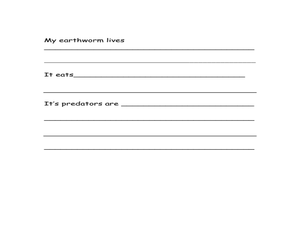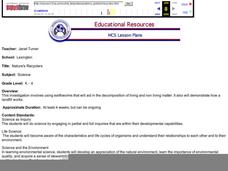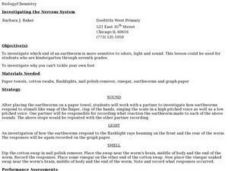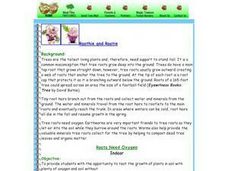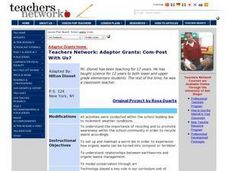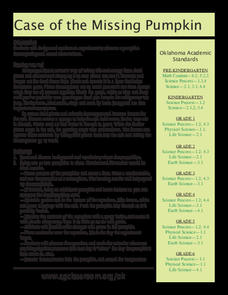Curated OER
Earthworms
Investigate the wonders of worms, earthworms to be precise. This presentation is perfect prior to studying earthworms in class. It provides basic information about their habitat, life cycle, predators, and what they like to eat.
Curated OER
Creeping and Crawling Observing Mealworms and Earthworms
Young scholars observe the inherited traits in earthworms and mealworms. In this organisms lesson, students view a live mealworm and earthworm on a tray and identify the body parts. Young scholars measure the worms and observe the...
National Wildlife Federation
Soil Decomposers
The class studies the soil food web that includes earthworms and conduct four experiments using the crawly critters. Individuals determine whether earthworms are sensitive to light, touch, temperature, and acid.
Baylor College
Animals' Needs
Explore the wonderful world of earthworms as your class learns about the requirements of animal life. After building soda bottle terrariums, students observe worms over the course of a couple weeks, building an understanding that all...
Curated OER
Earthworms and Making a Wormery
Learners explore the environment by researching insects. In this earthworm lesson, students utilize soil and plexiglass to build a see through wormery in which learners can observe the worms at work. Students identify the benefits of...
Curated OER
Worm Watching
Pupils examine the role earthworms play in building soils. They discuss worms and what they do with soil, make predictions and draw pictures, and observe their worms in soil over a two week period.
National Wildlife Federation
Soil Decomposers
Worms are the kings of the decomposers. A four-part lesson plan has learners experiment with the characteristics of earthworms and their sensitivities. They vary factors such as light, acidity, temperature, and touch of soil and observe...
Curated OER
Nature's Recyclers
Students create environments to demonstrate how earthworms interact with their surroundings.
Curated OER
Earthworm Nervous System
Investigate the nervous system of an earthworm! Your class gets into pairs to test, record, and draw conclusions about the reaction earthworms have to different stimuli (sound, light, and smell).
California Academy of Science
What Would Happen?
Nothing says classroom fun like an invertebrate and a magnifying glass! Snails, earthworms, and roly-poly bugs become the center of attention as pint-sized investigators hone their inquiry and observation skills. They are guided through...
Museum of Science
Terrarium
Make a premium terrarium. Learners create a miniature terrarium to study ecosystems. They use a clear container, along with rocks, soil, moss, leaves, woodland plants, earthworms, and bugs to construct their terrariums.
Museum of Science
Worm Farm
It is not a barrel of monkeys—it's a jar of worms! Scholars create a worm farm in a spaghetti sauce jar. Pupils layer moist soil, sand, and oatmeal to create a habitat for worms. Individuals place worms into the habitat, cover it with...
Curated OER
Roots Need Oxygen
Students investigate the growth of plants in soil with oxygen and soil without oxygen. They discuss what roots need to survive, and chart the growth of two plants to analyze the difference between plain soil and soil with two earthworms.
Curated OER
Com-Post With Us?
Students discuss the importance of reducing, recycling and reusing materials to help the environment. As a class, they create a worm bin and observe how it turns material in to compost. They use the internet to research the...
National Wildlife Federation
Habitat Web
Young scientists weave together an understanding of ecosystems with this fun collaborative activity. Taking on the roles of different living and non-living elements of specific habitats, learners use a ball of yarn to create the web of...
Curated OER
Case of the Missing Pumpkin
Scientists define and discuss decomposition, and watch pumpkins decompose and return to soil in classroom experiment. They record the date the experiment began, chart changes in pumpkins on a calendar, count how many days it takes...
Curated OER
Living-Nonliving
Students determine that environments have living and nonliving parts. They discuss what makes something a living thing and something a nonliving thing. They make a chart and list characteristics of living things and nonliving things.
Curated OER
Nature's Perfect Recycler
What a great way to start a recycling lesson! Introduce your students to the dung beetle! They will get a kick out of "nature's perfect recycler," when they learn about the scarab beetle's way of life: eating dung and rotting...
Curated OER
Mouse...Mouse...Snake!
Use this activity as an anticipatory set to warm up for a instructional activity on predator/prey relationships. Pupils will play a round of "Duck, Duck, Goose," substituting the ducks and geese for two animals that have a predator/prey...
Curated OER
F.B.I.
Learners create a worm bin full of fruit and vegetable scraps wit paper and observe what happens over time. For this decomposers lesson plan, students observe that the fruit and vegetable scraps become new soil.
Curated OER
Worm Compost & Vermicomposting
Students explore vermicomposting, the species of worms needed and the proper climate for it. In this composting lesson students make their own worm compost bin.
Curated OER
Soil Recipe
Young scholars examine the components of soil. They work together to use different materials to create their own soil. They make their own dirt cake as well.
Curated OER
Poetry Book-- Small Creatures
In this reading activity, students create a book of poems about small creatures of the garden by stapling 20 pages. Students read each short poem and color the pictures.
Curated OER
Case of the Missing Pumpkin
Young scholars explore the process of decomposition in plants. In this plant biology lesson, students use a cleaned out pumpkin and observe how the decomposition process takes place. Young scholars write down adjectives to describe the...
Other popular searches
- Nitrogen Cycle Earthworms
- All About Earthworms
- Earthworms and Soil
- Earthworms Experiment
- Earthworms Theme Units
- Earthworms Worksheet
- Respiration of Earthworms
- Earthworms Habitat
- Science Earthworms
- Giant Earthworms
- Observing Earthworms
- Earthworms Organs Systems






